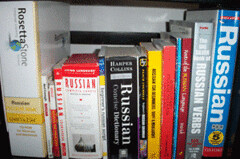Reviewing Unit 3
Today I reviewed lessons 1 and 2 from Unit 3 of RS. I hadn't realized how much vocabulary I had forgotten! I made flash cards with all the forgotten vocabulary. In total I have 7 flash cards with several words on each card.
I have made the flash cards according to the recommendations in How to Learn Any Language. Initially, I had planned to buy ready-made flash cards, but I am glad that I didn't. As stated in the book, these handmade cards are custom-made for my learning. Nevertheless, I have discovered something that I like even more about these cards. I like to see my own handwriting in Cyrillic. Barry Farber does mention the excitement of writing in a foreign language, but I hadn't expected to be so motivated by it.


When I began writing on my first flash card, my handwriting looked like a child's. I wrote about 3 or 4 flash cards and then decided to throw them away because my handwriting looked so ridiculous. I have now become more accustomed to it and I can see my own personality showing up in these foreign letters. At first the letters looked very blocked. Now they are less harsh.
I haven't learned the cursive Cyrillic letters. I saw a recommendation from someone that said to write your flash cards in both cursive and print, but I will stick to print for the time being.



